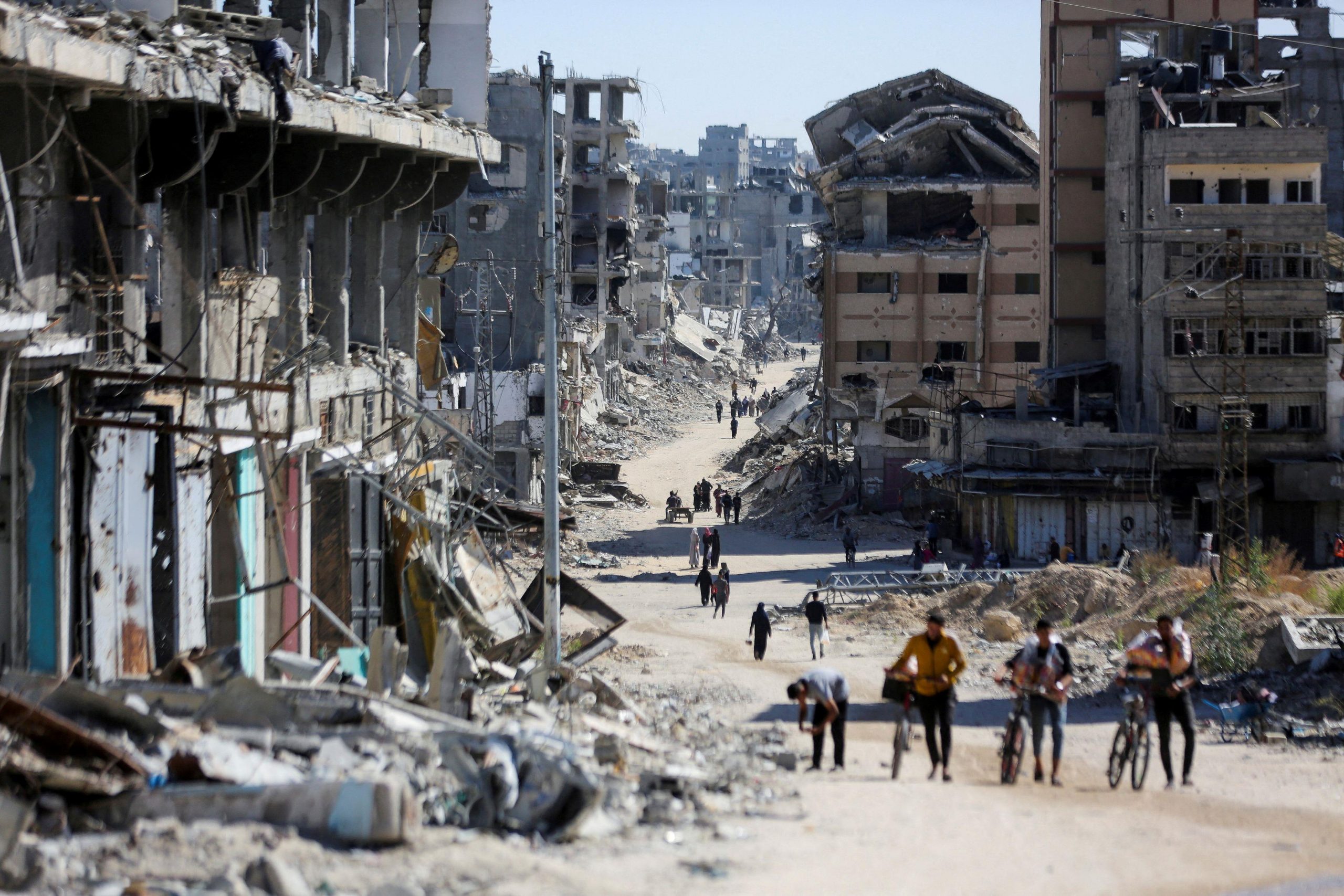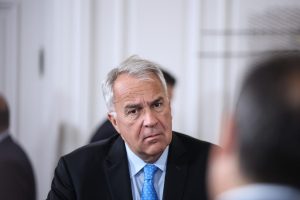Israel’s top cease-fire negotiator made a new offer to Hamas members: Enjoy safe passage to another country if you lay down your arms and release the hostages.
The proposal from Israeli spy chief David Barnea, made in a meeting with Egyptian officials this past week to break the impasse, was swiftly rejected by the U.S.-designated terrorist group, Arab mediators said.
Khalil al-Hayya, Hamas’s top cease-fire negotiator, said the offer showed how Israel was still misreading the group and warned it could continue fighting for months, if not years, the mediators said.
Israel’s Prime Minister Benjamin Netanyahu “has reiterated that we are willing to give them safe passage if they lay down their arms and release the hostages,” said Ophir Falk, the prime minister’s foreign-policy adviser. “At the same time, anyone who will hurt the hostages will be hunted down.”
Hamas didn’t respond to a request for comment.
U.S. and Israeli officials have talked about giving Hamas leaders and their men safe passage as a way to end the war since the early days of the conflict, and even offered a way out of Gaza to Yahya Sinwar. The Hamas leader rejected the offer. He was killed by Israeli troops this month.
The idea echoes Israel’s 1982 war in Lebanon, when Yasser Arafat and fellow Palestinian militants were allowed to leave Beirut for Tunisia.
But there are different calculations for Hamas than there were for Arafat. Hamas is fighting for what they believe is their homeland, while Arafat was fleeing one foreign base for another. And Hamas has deep roots in Gaza society, while many in Lebanon saw Arafat as a troublesome interloper.
Israel’s offer of safe passage underlined the new urgency to strike a deal after Sinwar’s death, with Hamas leaderless and Israel winning a series of military victories.
The idea is likely to come up again on Sunday, when U.S., Arab and Israeli officials are planning to meet in Qatar to renew cease-fire talks, according to the mediators.
Negotiators are skeptical of a breakthrough in the talks, which are scheduled for Sunday in Doha. The renewed efforts come as the region is bracing for Israel’s potential response to an Iranian ballistic-missile assault on Israeli territory earlier this month, amid concerns that it could spark a wider war, though the timing of any Israeli action remains unclear.
Still, Arab mediators believe the proposal put forward by Egypt for a short-term pause could open a window to a comprehensive deal, after weeks of deadlock. Central Intelligence Agency Director William Burns is scheduled to meet with the spy chiefs from Israel and Egypt, according to Arab mediators involved in the effort. Egyptian and Qatari officials are also expected to meet with Hamas, whose fighters are continuing to battle Israeli forces in Gaza and whose political leadership is based in Doha.
The renewed diplomatic push comes after a week of meetings between Secretary of State Antony Blinken and Israeli and Arab officials. Blinken rushed to the Middle East following the killing of Sinwar. Blinken then met Friday in London with, among others, the caretaker prime minister in Lebanon.
Israel is fighting Iranian allies on multiple fronts, including Hamas in Gaza, Hezbollah in Lebanon and the Houthis in Yemen. Arab mediators fear that Hamas will be unwilling to fully commit to a cease-fire deal while Israel is still considering how to retaliate against Iran.
Cease-fire discussions largely collapsed in recent months as Israel and Hamas failed to agree to terms for a permanent end to fighting. Senior U.S. officials had privately acknowledged a deal likely wouldn’t come together before the end of President Biden’s term.
Now, Egypt is proposing a small-scale cease-fire in an effort to build momentum for a larger deal that ends the war, according to Arab mediators involved in the talks. The Egyptian proposal calls for the release of five hostages held by Hamas in exchange for a cease-fire of up to two weeks and the potential release of Palestinian prisoners in Israeli jails, according to mediators. The agreement could then be extended. A weeklong pause in the fighting in late 2023 led to the only large-scale release of hostages during the war.
Netanyahu said Friday he welcomed Egypt’s readiness to advance a deal for the release of the hostages and had directed the head of Israel’s foreign intelligence agency, Mossad, to travel to Doha.
U.S. officials are skeptical that a cease-fire deal can be reached before the end of the Biden administration, largely because Hamas is currently leaderless after Israel killed Sinwar. Hamas hasn’t moved to immediately appoint a successor to Sinwar, instead agreeing that a council of leaders inside and outside the Palestinian territories will make decisions until a new leader is elected, potentially next year, according to people familiar with the group.
The war in Gaza began in October last year when Hamas launched an attack against Israel that killed about 1,200 people. Hamas and other Palestinian militant groups also kidnapped around 250 hostages, and about 100 still remain in Gaza, with many of those feared dead. The Israeli military campaign has caused the deaths of more than 42,000 Palestinians, according to authorities in the strip, who don’t say how many were combatants.
Hezbollah began firing rockets at Israel a day after the Hamas-led attacks, and the Israeli military in recent weeks has intensified a campaign against the Lebanese militia. Israel has launched a ground operation to remove Hezbollah’s presence from Israel’s northern border and has mounted airstrikes that have killed the group’s leaders, leveling buildings in the Lebanese capital, Beirut.
On Friday, an airstrike attributed to Israel hit a building in the Lebanese city of Hasbaya, about 5 miles from the Israeli border, killing three journalists. Two of the reporters worked for Al Mayadeen and the third for Al-Manar, two television stations regarded as pro-Hezbollah. The strike hit a guesthouse with more than a dozen other journalists from a range of media outlets who had marked the roofs of their cars parked outside with “press” to be seen from above, according to photos from the scene. The Israeli military didn’t respond to a request for comment.
Israel is also fighting Hamas on the ground in northern Gaza, seeking to kill militants who remain active despite the deaths of most of the group’s senior military and political leadership in the strip. Meanwhile, there is a growing humanitarian crisis in Gaza, particularly in the north, where aid distributions have plummeted amid a renewed Israeli campaign there.
Blinken met Friday with Lebanon’s caretaker prime minister, Najib Mikati, and then later with Jordan’s foreign minister, Ayman Safadi. He also met with United Arab Emirates Foreign Minister Abdullah bin Zayed al Nahyan.
Sitting with Blinken, Safadi accused Israel of “ethnic cleansing” in northern Gaza and said the Israeli government “is not listening to anybody,” in a rebuke of the American effort to influence Israel throughout the war. “We really stand at the brink of regional war now,” Safadi said.
Netanyahu’s office didn’t respond to the comments.



